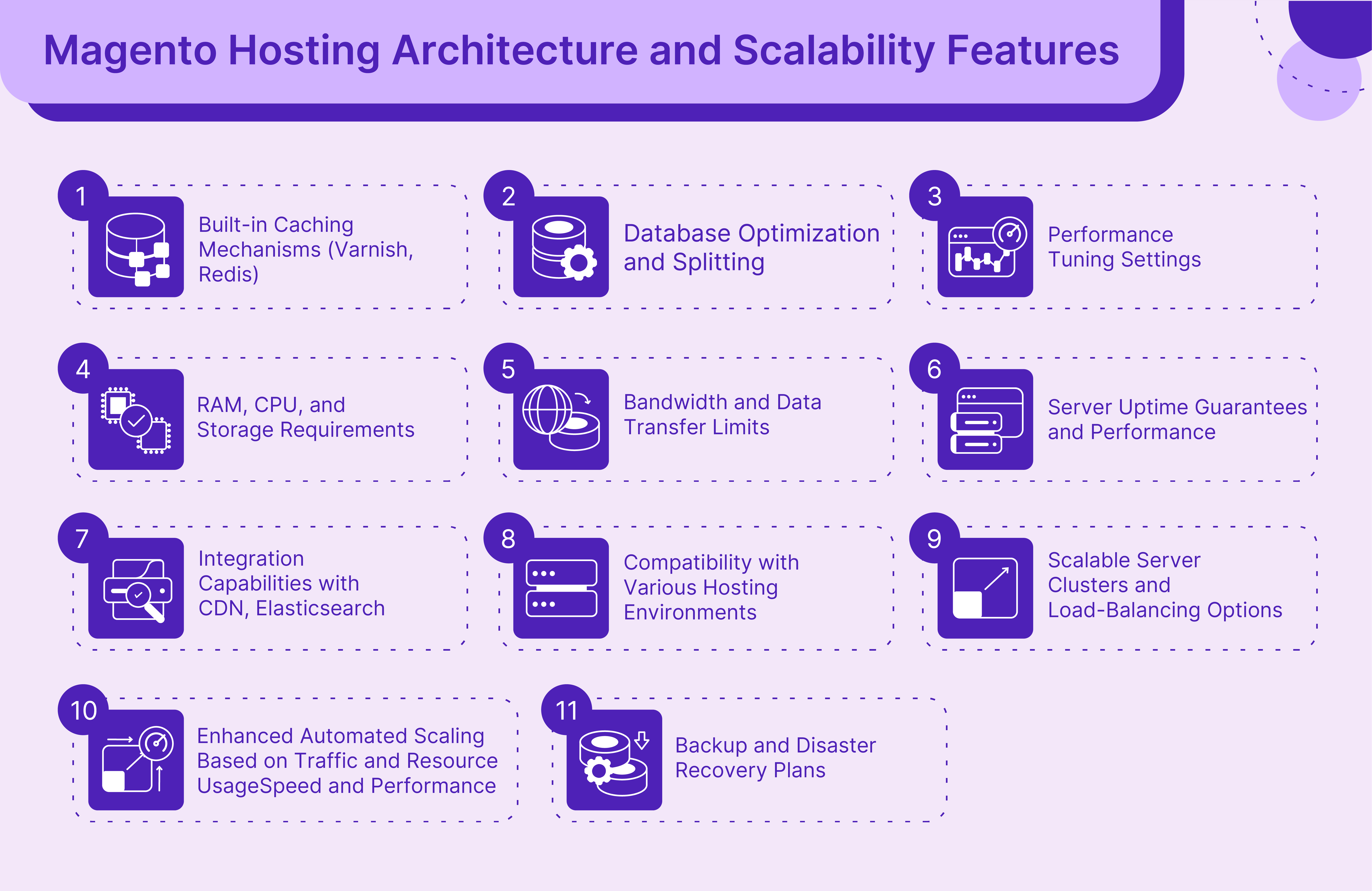
How Magento Webshop Hosting Optimizes Scaling and Drives Growth
Want to ensure the smooth scaling of your e-commerce shop? Magento webshop hosting is an effective solution. It aids in optimizing the scalability of your online shops. As the number of customers and transactions grows, dedicated hosting plays a key role. In this article, we discuss how Magento server hosting caters to scaling online shops.
Key Takeaways
-
Discover how Magento webshop hosting facilitates seamless scaling for e-commerce businesses.
-
Learn the importance of scalability, flexibility, and customer satisfaction for online shops.
-
Explore Magento's scalable features, including flexible architecture and performance optimization.
-
Understand how hosting enhances Magento scalability with dedicated resources and cloud solutions.
-
Get insights into scalability challenges and solutions, from traffic fluctuations to infrastructure limitations.
Importance of Scalability for Online Shops

-
Adaptability to Growth: The shop can grow with your business. It can handle more products, customers, and transactions.
-
Flexibility: Scalability allows flexibility in adjusting resources as needed. This ensures that you are not paying for unnecessary resources. You also have enough when demand increases.
-
Customer Satisfaction: With a scalable online shop, customers will experience fast service. They will also enjoy reliable service, even during peak periods of high traffic. This improves customer satisfaction and encourages repeat business.
-
Competitive Advantage: A scalable online shop gives you an edge. Competitors may not have the same agility. They might also lack the ability to handle growth.
-
Cost Efficiency: Scalable solutions are cost-effective. You pay for what you need, avoiding extra costs for unused capabilities.
Magento as a Scalable eCommerce Platform
Magento is popular for its robustness and scalability. It's an ideal choice for expanding online businesses. As an open-source platform, Magento offers flexibility and customizable features.
Key Features
- Flexible Architecture
Magento's architecture is modular. This makes it easy to customize and scale. You can add new functionalities as your business needs change.
- Performance Optimization
The platform includes features like full-page caching and indexing. These help manage traffic and data. They ensure quick load times.
- Scalable Infrastructure
Magento supports on-premise and cloud solutions. This supports scalable web hosting options. These options adjust resources based on traffic demands. This helps maintain the website's performance and user experience.
- Multi-store Capabilities
Magento allows businesses to manage many stores using one backend system. It offers easy scalability. This is ideal for businesses wanting to expand their products or target new markets.
- Community Support
It is an open-source platform with a community of developers and users. They contribute to its improvement. This community support helps businesses stay updated with the latest trends. It also helps tackle any issues that may arise during scalability.
- Integrations
Magento has a flexible API. It offers integration options for third-party extensions and applications. These integrations help businesses. They can add more features to their website without affecting performance.
How Right Web Hosting Enhances Magento Scalability
A hosting environment designed for Magento can improve your shop's ability to scale. It affects the site's performance under different loads.
Key Considerations
- Dedicated Resources
A managed hosting plan with dedicated resources is essential. It ensures your site has the power to handle traffic increases.
- Cloud Hosting Solutions
Cloud hosting offers scalable resources. It provides the flexibility to adjust as your business grows. This is ideal for sudden traffic spikes.
- Enhanced Security
A good hosting provider offers strong security measures. Security becomes more important as your online presence grows. This keeps customer data safe and maintains your customers' trust.
- Caching Capabilities
Magento websites can enjoy caching techniques such as Varnish or Redis. These help reduce server load and improve page load times.
- CDN Integration
Content Delivery Networks (CDN) can help distribute your site's content. They do this by using different servers around the world. This reduces latency and improves page load speeds for users in different locations.
- PCI Compliance
PCI compliance is essential for businesses that handle credit card information. A hosting provider with a PCI-compliant environment is important. It helps maintain security. This also helps avoid costly penalties.
- Scalability Monitoring
A good hosting provider offers monitoring services to ensure your site is performing. This includes tracking resource usage, identifying bottlenecks, and suggesting solutions for scalability issues.
Scalability Challenges for Online Shops

1. Traffic Fluctuations
- Resource Allocation
Ensuring there are enough resources to handle peak traffic times.
- Load Balancing
Distributing traffic across servers to avoid overload.
- Scalability Planning
Preparing for unexpected spikes in traffic to prevent downtime.
2. Inventory Management
- Stock Levels
Keeping the right amount of stock to meet demand without overstocking.
- Product Updates
Managing updates to product lines and categories .
- Integration
Ensuring inventory systems integrate well with other platforms like eCommerce and CRM systems.
3. Payment and Order Processing
- Processing Capacity
Increasing the capacity to process more orders and payments.
- Fraud Detection
Enhancing fraud detection measures as transaction volumes grow.
- Customer Service
Maintaining high-quality customer service during high order volumes.
4. Infrastructure Limitations
- Server Capacity
Upgrading servers or moving to cloud-based solutions to handle more traffic.
- Software Scalability
Ensuring eCommerce platforms and back-end systems can scale up as needed.
- Data Management
Managing larger sets of data from increased sales and customer interactions.
5. User Experience and Performance Issues
- Site Speed
Keeping the website fast to load and easy to navigate despite increased traffic.
- Mobile Optimization
Ensuring that your site has mobile optimization.
- Personalization
Providing personalized experiences to users without slowing down the site.
6. Security Risks and Compliance Requirements
- Data Protection
Enhancing data protection measures to secure customer information.
- Compliance
Meeting compliance requirements for different regions and types of data.
- Threat Detection
Improving threat detection and response mechanisms to deal with sophisticated attacks.
Magento Hosting Architecture and Scalability Features

1. Built-in Caching Mechanisms (Varnish, Redis)
Magento supports advanced caching mechanisms like Varnish and Redis. These technologies help speed up content delivery and reduce the load on servers.
Key Benefits:
- Faster Page Loads
Caching static content leads to quicker website performance.
- Efficient Resource Use
Reduces the demand on server resources by storing accessed data in memory.
2. Database Optimization and Splitting
Magento allows for database optimization and the separation of databases for different functionalities. This can improve performance and scalability.
Key Strategies
- Optimization
Streamlines database operations for faster access and processing.
- Splitting
Separates databases for products, orders, and checkout to reduce load.
3. Performance Tuning Settings
Magento offers various settings for performance tuning. You can adjust these settings. This optimizes speed and responsiveness according to the shop's specific needs.
Key Adjustments
- Caching Options
Fine-tuning caching strategies for different types of content.
- Index Management
Optimizing data indexing to speed up queries.
4. RAM, CPU, and Storage Requirements
Understanding your Magento setup's RAM, CPU, and storage requirements is crucial. Planning for these is key to scalability.
Key Considerations
- Adequate Resources
Ensure the server has enough RAM. It should also have enough CPU power to handle Magento's intensive processes.
- Storage Capacity
Planning for future growth in product listings and customer data.
5. Bandwidth and Data Transfer Limits
Bandwidth and data transfer limits are important factors in hosting architecture. They influence site performance and user experience.
Key Factors
- Enough Bandwidth
To accommodate high traffic volumes without slowing down.
- Data Transfer Policies
Understand the hosting provider's policies. This prevents unexpected fees or throttling.
6. Server Uptime Guarantees and Performance
Server uptime is critical for eCommerce success. Magento hosting should offer strong uptime guarantees and reliable performance.
Key Expectations
- High Uptime Guarantees
Look for hosting solutions with 99.9% uptime guarantees.
- Performance Monitoring
Tools and support to ensure optimal server performance.
7. Integration Capabilities with CDN, Elasticsearch
Magento supports integration with a Content Delivery Network (CDN) and Elasticsearch. These integrations enhance speed and search functionality.
Key Integrations
- CDN
Distributes content globally to speed up load times for users worldwide.
- Elasticsearch
Provides advanced search capabilities, improving user experience.
8. Compatibility with Various Hosting Environments
Magento is compatible with a range of hosting environments and technologies. This includes dedicated, shared, and cloud hosting, as well as support for PHP and MySQL.
Key Flexibility
- Hosting Options
Allows businesses to choose the best environment. Size, traffic, and budget determine decisions.
- Technology Support
Ensures Magento can run on a variety of technical infrastructures.
9. Scalable Server Clusters and Load-Balancing Options
You can configure Magento to use scalable server clusters. Load-balancing distributes traffic across servers to manage loads.
Key Features
- Server Clusters
Enhance capacity and reliability.
- Load-Balancing
Ensures no single server becomes overwhelmed, maintaining site performance.
10. Automated Scaling Based on Traffic and Resource Usage
Some Magento hosting solutions offer automated scaling. This adjusts resources based on real-time traffic and usage data.
Key Automation
- Dynamic Resource Allocation
Increases server resources during traffic spikes.
- Efficiency
Reduces costs by scaling down during lower traffic periods.
11. Backup and Disaster Recovery Plans
Having robust backup and disaster recovery plans is essential. This ensures data is safe and the site restoration can occur in case of an issue.
Key Safeguards
- Regular Backups
Protects against data loss from hardware failures or cyber-attacks.
- Recovery Strategies
Plans for quick restoration of services after an outage or disaster.
FAQs
1. What is the difference between shared, dedicated, and VPS hosting for Magento?
Shared hosting is the most cost-effective option. Many users shared the resources. Dedicated hosting for Magento offers exclusive use of server resources.
It's ideal for high-traffic Magento sites. VPS hosting sits between the two. It provides a virtual dedicated environment within a shared server.
2. How does managed Magento hosting differ from regular web hosting plans?
Managed Magento hosting plans have customization for the Magento platform. Magento experts optimize and oversee them.
The experts handle all technical aspects, from installation to security. In contrast, standard web hosting plans may need the installation of Magento. You might also have to manage the server yourself.
3. Can you recommend some of the best Magento hosting providers in 2024?
MGT-Commerce, A2 Hosting, and InMotion Hosting are the top picks. They are the recommended Magento hosting providers in 2024.
Their robust performance, excellent customer support, and Magento optimization earn them recognition.
4. What are the benefits of choosing a Magento cloud hosting solution?
Magento cloud hosting provides scalability, reliability, and performance. It's tailored to handle fluctuating traffic on a Magento site.
This guarantees optimal performance, even during peak periods. Moreover, it often includes extra security and management features.
5. Why should a business consider a managed Magento hosting service?
A managed Magento web hosting platform provides businesses with peace of mind. It takes care of all the technical aspects of running a Magento site.
This includes updates, backups, security, and performance optimization. This enables businesses to concentrate on growth and customer service.
6. How do I install Magento on my server, and can Magento hosting services help?
Installing the Magento server involves downloading the software from the official Magento website. Then, follow the installation instructions.
Many Magento hosting services offer one-click installs. They can also handle the installation for you. This simplifies the process.
7. Are there any specific benefits of using Magento 2 hosting companies for a new Magento site?
Magento 2 hosting companies focus on hosting for the Magento 2 platform. They provide optimized environments tailored to meet Magento 2's specific requirements.
Selecting the best Magento hosting can enhance site performance. It improves security and user experience. This is important for a new Magento site.
Summary
Magento webshop hosting helps scale your e-commerce shops. This is important for managing traffic spikes. It offers:
-
Magento hosting ensures flexibility and scalability for your store's growth.
-
Its features, like flexible architecture and performance optimization, enable smooth scaling.
-
We address challenges like traffic fluctuations and infrastructure limitations.
-
Optimize your store today with managed Magento hosting.
-
Ready to scale your online shop with ease? Explore managed Magento hosting now!
Ready to optimize your store? Explore managed Magento hosting for seamless growth.




